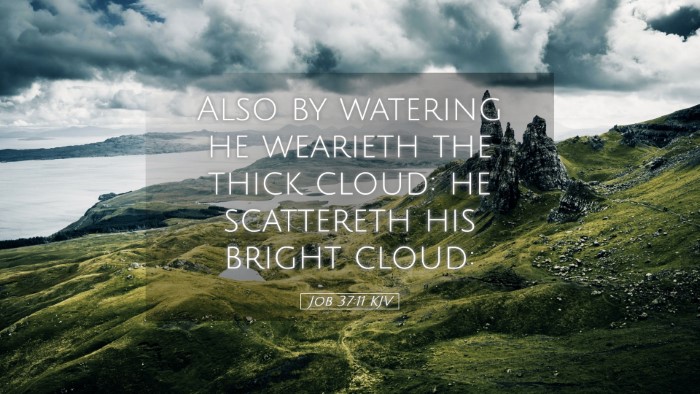Old Testament
Genesis Exodus Leviticus Numbers Deuteronomy Joshua Judges Ruth 1 Samuel 2 Samuel 1 Kings 2 Kings 1 Chronicles 2 Chronicles Ezra Nehemiah Esther Job Psalms Proverbs Ecclesiastes Song of Solomon Isaiah Jeremiah Lamentations Ezekiel Daniel Hosea Joel Amos Obadiah Jonah Micah Nahum Habakkuk Zephaniah Haggai Zechariah MalachiJob 37:11
Job 37:11 KJV
Also by watering he wearieth the thick cloud: he scattereth his bright cloud:
Job 37:11 Bible Commentary
Commentary on Job 37:11
Job 37:11 reads: "Also by watering does he weigh the thick clouds; he scatters the bright clouds." This verse is situated within a larger discourse on the majesty and sovereignty of God, presented by Elihu, as he speaks to Job about God's creation and control over the natural world. This analysis will reflect the views of several public domain commentators: Matthew Henry, Albert Barnes, and Adam Clarke.
Contextual Background
In the Book of Job, the dialogue revolves around suffering, justice, and the nature of God. Job, a suffering servant, questions the reasons behind his afflictions, while his friends attempt to explain his suffering through various theological paradigms. Elihu, a younger character in the narrative, enters the fray to defend God's justice and the idea that suffering can be a means of divine communication and growth.
Understanding Job 37:11
This particular verse illustrates the creative power of God, emphasizing His control over meteorological phenomena. The imagery of watering and weighing clouds suggests not just God's omnipotence but His meticulous engagement with creation.
Matthew Henry's Commentary
Matthew Henry highlights the profound connection between God's majesty and His providence. He notes that the act of watering the earth is not a mere happenstance but a divine orchestration:
- Divine Sovereignty: Henry emphasizes that God weighs the thick clouds, demonstrating His authority over the forces of nature. This metaphor suggests that the Lord has a precise purpose for every weather event.
- Natural Phenomena as Communication: He posits that natural occurrences are manifestations of divine interaction with the world. The act of scattering bright clouds can symbolize moments of hope and revelation amid the tumult of life.
Albert Barnes' Commentary
Albert Barnes provides a detailed exegesis of the verse, focusing on the dual actions described: watering and scattering. He elucidates:
- The Weighing of Clouds: Barnes interprets this as indicating God’s careful and deliberate control over creation. The imagery conveys that just as a merchant weighs goods to ensure fairness, God measures the clouds to determine the right amount of rain to bestow upon the earth.
- Meteorological Impact: He also addresses the significance of rainfall, stressing that it is not only essential for agriculture but also symbolic of spiritual nourishment. Just as rain replenishes the earth, divine intervention brings renewal to the soul.
Adam Clarke's Commentary
Adam Clarke offers insights into the poetic nature of this verse, providing a more literary approach:
- Imagery of Clouds: Clarke notes the beauty of the description – the "bright clouds" serve as a metaphor for God's presence, hints at the light of divine truth amidst life's storms. The beauty of clouds, illuminated by the sun, is paralleled with moments of divine revelation.
- Cultivation of the Earth: He connects the act of watering with God's care not just for creation at large but for humanity. The focus on clouds speaks to God’s grace, which falls upon both the righteous and the unrighteous alike.
Theological Implications
From these commentaries, several theological implications can be derived:
- God's Sovereignty: The overarching theme is God's sovereignty over nature, indicating that the Creator is intimately aware of and involved in the world He made.
- Understanding Suffering: Elihu’s discourse serves as a reminder that suffering can be part of a greater purpose. Just as rain is essential for growth, so too can suffering cultivate spiritual depth.
- Nature as a Revelation: Nature communicates truths about God. The natural world's rhythm can lead believers to worship and recognize the presence of God in daily life.
Application for Pastors and Theologians
Job 37:11 serves as a rich source of reflection for ministers and scholars alike:
- Encouragement in Despair: Pastors can remind congregations that God is present in their struggles, much like He is active in the natural processes surrounding them.
- Teaching on Divine Providence: This verse invites discussions on how God operates in the world in ways that might be unseen, encouraging deeper trust among believers in His plan.
- Connecting Faith and Nature: The relationship between nature and faith underscores the significance of creation care. The understanding that all of creation is under God's dominion motivates believers to steward the earth responsibly.
Conclusion
Job 37:11 invites the faithful to reflect on the attributes of God as Creator and sustainer. Through the insights from earlier commentators, we are reminded that God's control over nature is a reflection of His omnipotence, wisdom, and care for His creation. As we navigate the complexities of life, particularly in times of distress, let us find solace in the knowledge that just as God orchestrates the rains and clouds, He is equally at work in our lives, balancing justice, mercy, and grace.


